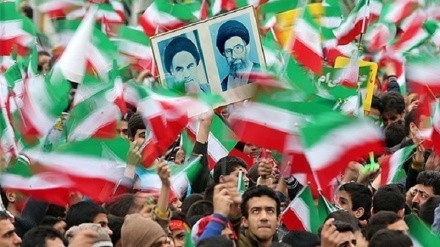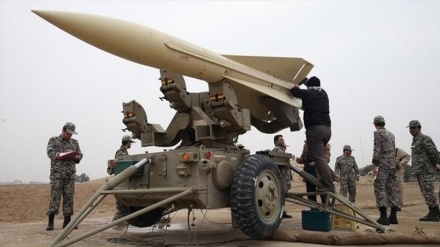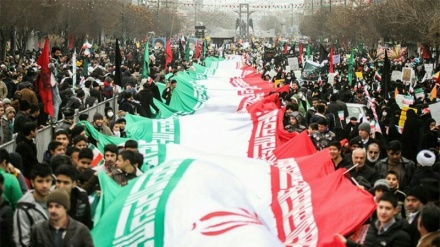Iran 40 years after victory of the Islamic Revolution (4)
The robustness and liveliness of the Islamic Revolution in its 40 anniversary indicates the growth from strength to strength to the chagrin of the enemies. Since its victory in February 1979, the Islamic Revolution has been the main target of the American statesmen and presidents.
Since nearly two years ago that the US president Donald Trump entered the White House with brouhaha, a new chapter of the US enmities began against Islam and the Islamic Republic of Iran. Trump announced that the agreement on the chronic challenge between the United States and Iran, namely the nuclear issue, was a catastrophic treaty for the US because the US has given many concessions to the Iranian government for trivial gains. He stressed his opposition against the agreement, saying that he would try, via change in the content of the JCPOA, to double and triple the sanctions to force Iran to come to the negotiation table once more. The American president, in his debate with the Democrat candidate, pointing that JCPOA had jeopardized the Israeli security, claimed that the JCPOA was a masterpiece of Hillary Clinton's foreign policy since it turned Iran into a great power. Trump in his second debate claimed that Iran is the sponsor of terrorism. Then, in his last debate, he criticized the US foreign policy about the developments in West Asia, saying that the only winner of these developments is Iran and it has turned into a regional power which tries to get the upper hand in Iraq.
In 2017, threat and sanction once more became the keywords of the US hostile policies against Iran. In 2018, this trend was intensified so that Trump in 2018 officially violated the nuclear agreement and publicly announced his exit from JCPOA. Ileana Ros-Lehtinen former Chairwoman of the House Foreign Affairs Committee, said at the Committee in March 2017 that the United States will ratify such paralyzing sanctions against Iran to force the latter to revise its decision for development of Ballistic Missiles Program. According to the pattern, the US Treasury sanctioned 7 persons and Iranian and non-Iranian companies just 7 months after Trump's coming to power with the pretext of links with Iran's missile program. In July, too, the US put the names of 18 persons in the list of sanctions with the pretexts of connections to Iran's missile program.
The US House of Representatives on July, 25, 2017, approved the comprehensive plan of Iran sanctions with 419 votes. The American Senate also ratified the plan with 98 votes.
Therefore, Trump abused the supervising capacities of JCPOA and pressured allies and other countries not to cooperate with Iran in a vain bid to draw Iran to the negotiating table once more. The baseless allegation of Iran's support for terrorism in the region and severance of Iran's financial and supportive sources for the groups of Resistance Front, were part of this policy. Iran's defence activities have also been put on Trump's agenda. The strategic toll of the US has always focused on increase of sanctions to pressure the Islamic Republic and force it to negotiate on regional and defence issues to change the text of JCPOA to further deprive Iran of its rights.
The Trump administration first tried to suspend the implementation of JCPOA so that foreign investors couldn’t dare enter Iran's economy. With the refusal of foreign investors to enter Iran, the Islamic Republic would in effect be bottlenecked to exit the JCPOA without any legal consequences for the US. But, Trump faced harsh criticisms by other 4 members of the UN Security Council, who were saying that JCPOA is an international treaty enjoying the UNSC support; hence cannot be rescinded easily.
The US president, however, used just foul expressions and hollow allegations against the Iranian nation.
In addition to the US breach of an international treaty, the US hostility can be seen in other grounds, too. Head of the Washington-based National Iranian American Council (NIAC) made it clear that Trump's language on Iran and his first foreign trip to Saudi Arabia reveal the path which makes conflict and adversary more likely.
Ayatollah Khamenei said in mid-2017, "The verbosity of the American president is not a new issue as the Islamic system has been facing various conspiracies since the beginning; but the ill-wishers haven't been able to do a damn thing."
Trump's announced strategy is mostly the repetition of the previous White House policies against the Iranian nation.
Trump's weird remarks and conducts have strengthened the likelihood of international opposition to the US policies. Before Donald Trump's presidency, the United States of America tried for more than a decade to obstruct the path of Iran's progress in peaceful nuclear know-how. But when the US concluded that the sanctions and pressures were inefficient vis-a-vis Iranian nation's resolve, the US proposed negotiations and finally imposed the Joint Comprehensive Plan of Action; though it knows that Islamic Iran has never pursued atomic weapons and will never be a threat to the regional countries. The Islamic Republic of Iran has acted in full compliance with the content of the JCPOA but the US not only has not been committed to any of the articles of the agreement; it has increased the illegal sanctions against the Iranian nation and breached every phrase of the internationally approved agreement.
RM/ME


